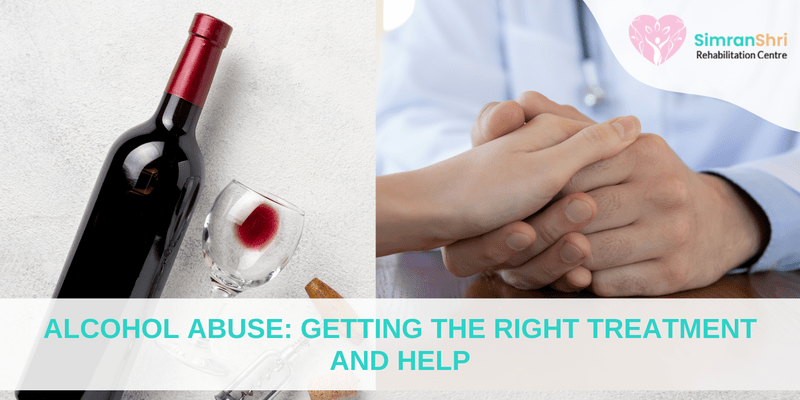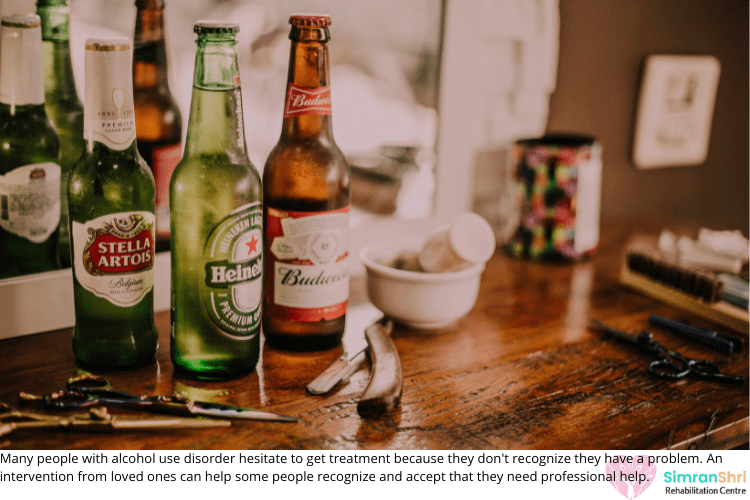

Alcohol abuse may occur due to a variety of reasons. It could be due to peer pressure, a need to unwind, a coping technique for anxiety, sadness, stress, loneliness, self-doubt or dissatisfaction, or a history of alcohol abuse in the family. Recognizing the triggers that make you want to drink is an important part of living with alcohol abuse. Hanging out with people who drink, for example, will make it tough for you. You're not alone if you don't have a counsellor or confidante to talk to about your stress or sadness. This may lead you to turn to alcohol as a coping mechanism.
If you do not acknowledge that you need alcohol abuse treatment, you will continue to struggle with alcohol consumption. Please continue reading to learn when does use take the form of abuse and the signs one needs alcohol addiction help.

'Use' means 'to put into action, and 'Abuse' means 'to put to a wrong or improper use. Meaning when you use something beyond a certain advised permissible limit, you're abusing/misusing it- that is when one requires alcohol addiction help.
According to experts, depending on your circumstances, there are five types of alcoholics:
1. Young Adult Alcoholics: Begin drinking as early as high school, some due to peer pressure, some for sheer experience, and some for deeply personal issues.
2. Young Antisocial Alcoholics: The ‘rebels’—young people who feel they've been wronged; also, misguided young adults who think drinking & snorting (drugs) is the way to make statements.
3. Intermediate Familial: Genetic predisposition; a history of drinking in the family. Teens may get invited for a drink by the adults/elderly. In many cases, that's the root of the gradual habit.
4. Functional Alcoholics: Drinks are their means of finding a balance between their work & life. And because they don’t drink over a certain limit, they aren’t as easily prone to the health issues alcohol can cause.
5. Chronic Severe Alcoholics: Heavy drinkers. Alcoholism has become a part of their life.
We know that alcoholism, or alcohol disorder—clinically termed 'Alcohol Use Disorder (AUD)' has roots in our psychological and emotional issues, which are a byproduct of our brain chemistry. With that in mind, listed below are the different branches of dependency AUD is classified into as per the W.H.O., as published in the January 2020 edition of ‘Journal of Family Medicine & Primary Care’:
● As per Volume & Frequency:
1. Social Drinking: Moderate drinking; no more than two drinks/day for men, no more than 1 for women.
2. Binge Drinking: 'Back-to-Back,' or non-stop; multiple drinks within 2 hours – 5 or more for men, four or more for women.
● As per Patterns:
3. Harmful drinking: Physical or psychological harm to the individual(s) or society (i.e., others living around said individuals).
4. Hazardous drinking: Puts the individual(s) at the risk of health-adverse issues.
5. Alcohol dependence: A swarm of behavioural, cognitive, and physiological phenomena that develop from continuous alcohol use; typically include a strong desire to keep up, having immense difficulty in controlling the desire despite the harm it's already causing, giving higher priority to alcohol than to other far more essential activities and obligations; increased tolerance.
Regardless of the severity or history of abuse, the best alcohol dependence treatment can help individuals recover.
Alcohol addiction can range from mild to severe depending on the number of symptoms exhibited by an individual. These signs and alcohol addiction symptoms help identify the need for seeking help from an alcohol rehabilitation centre:
● Inability to cut down alcohol intake
● Failed attempts on quitting or reducing alcohol intake
● Most of the time is spent in getting access to, drinking, or recovering from alcohol
● Uncontrollable cravings or urges to drink
● Unproductivity at the professional front, not meeting social obligations etc.
● Continued alcohol use despite physical, psychological and social repercussions.
● Avoiding social activities, responsibilities or hobbies due to alcohol
● Alcohol use in risky settings such as while driving, swimming, etc.
● Build a tolerance such that a higher amount of alcohol is required to feel the desired effect.
● Experiencing withdrawal symptoms on abstaining from alcohol use include trembling, sweating, nausea, etc.
It is advisable to follow a substance use disorder treatment while quitting alcohol or drugs as these withdrawal symptoms can be fatal.
It's critical to get the proper alcohol abuse treatment at the right moment if you want to start living a healthy lifestyle. The following are some examples of common alcohol addiction treatment plans:
Detoxification eliminates toxins from the body by dieting, fasting, or colon cleansing (flushing out your large intestine).
Medications include sedatives, vitamins, and alcohol addiction medication. The first two entail injecting medicinal substances to assist diminish cravings and eventually eliminate the desire to consume alcoholic beverages. The third type of drug causes an involuntary evacuation of alcoholic content (nausea, dizziness, followed by vomiting). Mental health professionals supervise the use of Alcohol addiction medications at rehab centres. Individuals should refrain from self-medicating to avoid harmful effects.
Psychotherapy- Support groups, cognitive behavioural therapy, aversion therapy, family therapy, behaviour therapy, psychotherapy, group psychotherapy, and counselling are available.
Tags: alcohol abuse treatment, alcohol addiction help, alcohol addiction medication, alcohol addiction symptoms